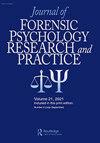‘It’s so Hard to Get Out of that Bubble’. A Phenomenological Analysis with Men Who Have Stalked
IF 1.1
4区 心理学
Q4 CRIMINOLOGY & PENOLOGY
Journal of Forensic Psychology Research and Practice
Pub Date : 2021-05-27
DOI:10.1080/24732850.2020.1855385
引用次数: 7
Abstract
ABSTRACT Research exploring the experiences of men who have stalked is lacking, specifically how they construe their reality for stalking episodes. Addressing this absence of experiential expert contribution was the pivotal and timely aim of this research, given interventions for stalking are under-developed. Seven in-depth interviews were conducted with men convicted of stalking and held in UK prisons. Interpretative Phenomenological Analysis (IPA) was used with a unique, visually adapted repertory grid technique, derived from Personal Construct psychology (PCP). Both methods allow the researcher to explore the sense-making of experts by experience, hence the combined methodology produced an in-depth assessment of the phenomenon of stalking. This was the first study to capture the constructed realities of men who stalk, and the first study to use repertory grids with stalkers, piloting a visually adapted repertory grid technique for maximizing engagement. High levels of convergence between participants were found, with the analysis leading to the generation of three superordinate themes: (i) Neediness, (ii) “Nothing could stop me”, and (iii) Labeling, which were broadly supported by the repertory grid analyses. The findings contribute to both knowledge and practice gaps by supporting the relational goal pursuit theory for stalking and providing an evidence base to support therapeutic interventions for people who stalk. The effectiveness of deterrence and a need to improve social awareness for stalking are discussed.“很难走出泡沫”。对跟踪者的现象学分析
研究被跟踪的男性的经历,特别是他们如何解释他们的跟踪事件的现实是缺乏的。鉴于跟踪的干预措施尚不发达,解决这种缺乏经验专家贡献的问题是本研究的关键和及时目标。对被判跟踪罪并被关押在英国监狱的男性进行了七次深度访谈。解释性现象学分析(IPA)采用了一种独特的、视觉适应的存储网格技术,源自个人构念心理学(PCP)。两种方法都允许研究人员通过经验来探索专家的意义,因此结合的方法产生了对跟踪现象的深入评估。这是第一个捕捉跟踪者的构建现实的研究,也是第一个对跟踪者使用剧目网格的研究,试验了一种视觉上适应的剧目网格技术,以最大限度地提高参与度。与会者之间的高度趋同,通过分析产生了三个优先主题:(i)需要,(ii)“没有什么能阻止我”和(iii)标签,这些主题得到了汇编网格分析的广泛支持。研究结果支持了跟踪行为的关系目标追求理论,并为跟踪者的治疗干预提供了证据基础,从而弥补了知识和实践上的差距。讨论了威慑的有效性和提高跟踪行为社会意识的必要性。
本文章由计算机程序翻译,如有差异,请以英文原文为准。
求助全文
约1分钟内获得全文
求助全文
来源期刊
CiteScore
1.80
自引率
12.50%
发文量
53

 求助内容:
求助内容: 应助结果提醒方式:
应助结果提醒方式:


